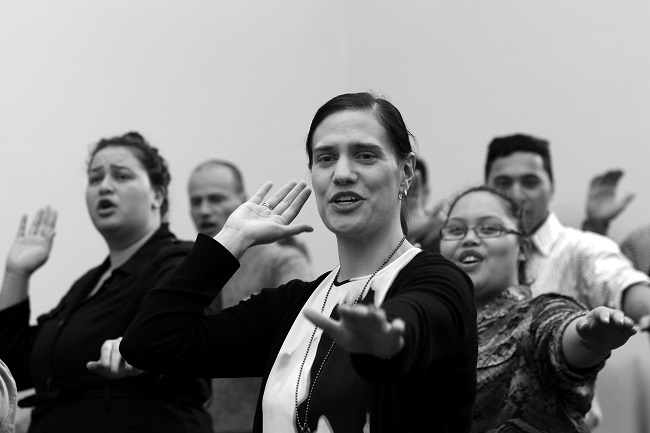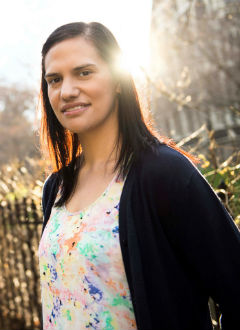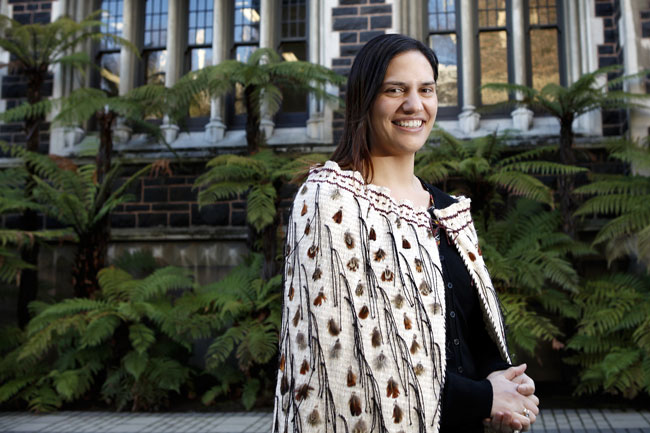Dr Karyn Paringatai

The revival of an ancient Māori method of teaching in the dark has had spectacular results for Dr Karyn Paringatai and her students.
When Dr Karyn Paringatai (Te Tumu: School of Māori, Pacific and Indigenous Studies) was researching ways of improving her students' learning experiences, she looked to the past.
Paringatai's Introduction to Māori Performing Arts course was a challenge – her students range from a few who speak Māori to international students who do not even speak English as their first language. Instead of turning on some technological wizardry, she simply turned off the lights.
Paringatai explains that she had heard about a pre-European Māori method of teaching in the dark, practiced at whare wānanga. Learning usually took place in the winter months, often in total or semi-darkness, and the students quickly absorbed and retained screeds of information to be passed down through the generations.
Paringatai felt that the same technique might help her students to focus on what they were hearing, rather than what they were seeing, when they were learning the lyrics and tune or beat to various waiata and haka. “We were half way through the semester in 2011 and I thought, 'Let's just give it a go'.”
She requisitioned a windowless room, recited the words and had the students repeat what they heard, before they learned the actions with the lights on.
The results were spectacular. Inhibitions were lost, listening skills and pronunciation were enhanced, and songs that previously took most of the students several weeks to learn from words projected on a wall were mastered in a couple of hours.
 Paringatai says that there were other benefits too. “The students gained confidence and there was more time to spend on their performance skills and on understanding and emotionally connecting with the items, which led to higher grades.”
Paringatai says that there were other benefits too. “The students gained confidence and there was more time to spend on their performance skills and on understanding and emotionally connecting with the items, which led to higher grades.”
Paringatai has since introduced the technique to her Māori language classes and as a guest lecturer in a culture and society paper. One of her former students also tried the learning tool when she was teaching law at the University of Auckland, to get students to concentrate on pre-recorded background information from a judge.
Paringatai has been spreading the word about the benefits of the teaching method, through media interviews, speaking engagements and an article in the University of Otago Higher Education Development Centre's periodical, Akoranga.
A grandmother in Auckland wrote asking for more information after one radio interview. She thought that learning in the dark might be a way of helping her grandchild, who was struggling with schoolwork.
“I am absolutely humbled that people are taking this on board,” says Paringatai. “And I am more than willing to share this methodology because it is acknowledging Māori pedagogies as a valid form of learning, not just for Māori, but for everyone.”
The 36-year-old's pioneering work contributed to her winning the Prime Minister's Supreme Award at the 2014 Tertiary Teaching Excellence Awards. The citation described her revival of the ancient practice of teaching in the dark and subsequent research into its benefits as world leading.

Paringatai's outstanding achievements are all the more remarkable because she lives with the consequences of a serious medical condition. She had her stomach removed five years ago after testing positive for a mutated gene than runs through her extended family and carries an 85 per cent chance of developing a lethal stomach cancer.
She explains that she is still learning how her body reacts to certain foods and liquids, but it hasn't stopped her from taking part in a variety of activities: rugby league, tag football, netball, boxing, triathlons and half marathons, one to raise awareness of the condition.
“Life is about experiences and trying new things. And for my students, learning in the dark is an experience they will never forget.”
FUNDING
University of Otago Committee for the Advancement of Teaching and Learning
Click here to view Karyn's departmental profile on the Te Tumu: School of Māori, Pacific and Indigenous Studies website.